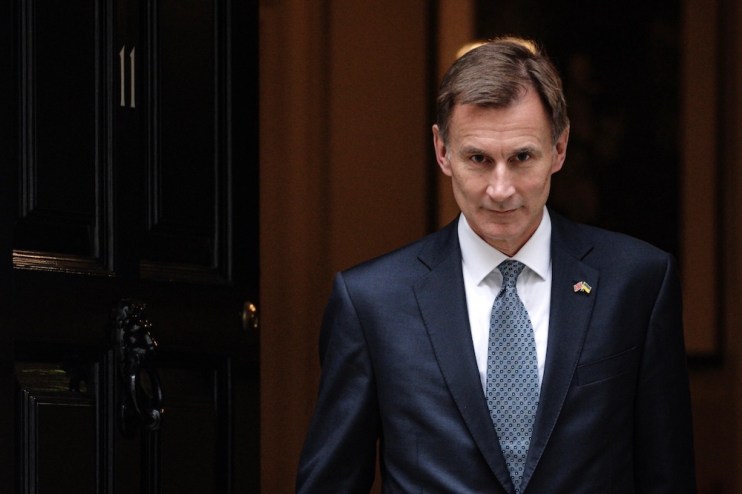Softened windfall tax not enough to turn tide on falling North Sea investment, Hunt warned

The government needs to do more than ease the windfall tax to reassure troubled North Sea oil and gas companies over the UK’s investment climate and protect future production, warned Offshore Energies UK (OEUK).
The industry body’s chief executive David Whitehouse welcomed the Treasury’s decision to introduce a price floor into the Energy Profits Levy, and said it was only fair that “when the windfall conditions go, the windfall tax should go.”
However, he believed this had to be the starting point for improving investment conditions in the North Sea rather than a conclusive policy.
“This is a step in the right direction, but many more will need to be taken to restore confidence to our sector. We will now work closely with government and lenders to understand the detail of the measure and its effectiveness at unlocking investment,” he said.
This follows the Treasury unveiling the Energy Security Investment Mechanism (ESIM) earlier today, which establishes a price floor at $71.40 per barrel and 54p per therm.
At this point, the Energy Profits Levy – known as the windfall tax – would fall away entirely, with taxes on earnings dropping from 75 to 40 per cent.
However, oil prices would need to fall below the price floor for a period of six months for the windfall tax to be removed.
Based on forecasts from the Office for Budget Responsibly, ESIM will not be triggered before the tax’s planned end date in March 2028.
City A.M. first revealed the industry was pushing for a price floor earlier this year, which was being considered by the Treasury ahead of ‘Green Day’ – the government response to the US Inflation Reduction Act which turned out to be highly underwhelming.
ESIM is designed to bolster certainty in the oil and gas sector to raise capital, following fossil fuel producers including Total, Enquest and Harbour Energy withdrawing from key projects this year.
Meanwhile, Rosebank – the largest undeveloped oil and gas field in the North Sea – faces an uncertain future with minority stakeholder Ithaca Energy weighing up whether to invest in the project.
It has been locked in talks with the government over the project for months, as exclusively covered by City A.M.
North Sea oil and gas exploration is featured in the government’s energy security strategy – as it looks to reduce its reliance overseas supplies.
However, today’s announcement has been panned within the industry, with criticisms aimed at the price floor’s low oil price and forecast lack of usage.
This meant they feared it would fail to encourage more investment in the North Sea.
An industry source told City A.M. that the ESIM “doesn’t do anything” to change investment conditions and will not encourage banks – which have toughened lending rules – to provide more capital to oil and gas companies.
They dismissed the floor threshold as below conventional conditions – with six month periods of oil prices that low typically representing only severe economic conditions.
Another industry source told City A.M. they were “extremely disappointed.”
The government has been approached for comment.
Windfall tax change ‘will not make material difference’
The oil and gas sector was not the only industry urging the government to do more, with Aberdeen and Grampian Chamber of Commerce fearing the “finish line is still some way off” if Downing Street is serious about “unlocking the investment trapped by its current fiscal regime.”
Chief executive Russell Borthwick believed the announcement exposed that the government “recognises their mistake” but feared the latest changes “will not make material difference.”
“Prices have already returned to historically normal levels, so there are no windfall profits to tax. The changes announced today will do little to reverse the worrying trends we are seeing as it’s highly unlikely the oil price will fall below the floor for a six-month period any time soon,” he said.
Borthwick called on the government to lower the effective 75 per cent tax rate, to unlock “billions of pounds worth of investment and thousands of new jobs being created in the North Sea.”
The Climate Change Committee, Westminster’s independent advisory group, predicts half of the UK’s energy requirements between now and 2050 will still be met by oil and gas, and as much as 64 per cent of UK energy needs between 2022 and 2037.
Currently, 75 per cent of the UK’s overall energy needs are met by oil and gas – despite huge advancements in renewable generation.
Earlier this year, the North Sea Transition Authority calculated that annual crude oil and gas production will effectively halve over the current decade, alongside a sharp drop in capital expenditure,
These numbers are not only stark, but a sharp revision to recent figures, with the NSTA predicting five mega-tonnes more of oil and gas over the same period before Chancellor Jeremy Hunt toughened the windfall tax last November.
There was pushback from energy transition group Uplift – which is calling for no new oil and gas projects in the North Sea to ensure the UK meets its climate goals and also backs the windfall tax to fund support for households grappling with ultra-high energy bills.
It criticised ESIM for being too lenient to the industry, with chief executive Tessa Khan accusing Hunt of putting “the interests of profiteering oil and gas companies ahead of the British public. “
She said: “Instead of bending to the will of oil companies, the Chancellor needs to accelerate a rapid shift away from oil and gas onto cheaper renewables, which will guarantee lower bills and which polling shows is unsurprisingly what the majority of people in the UK want.”